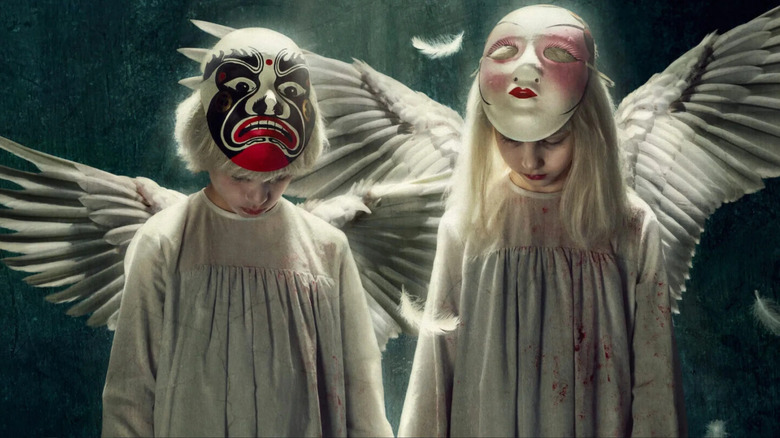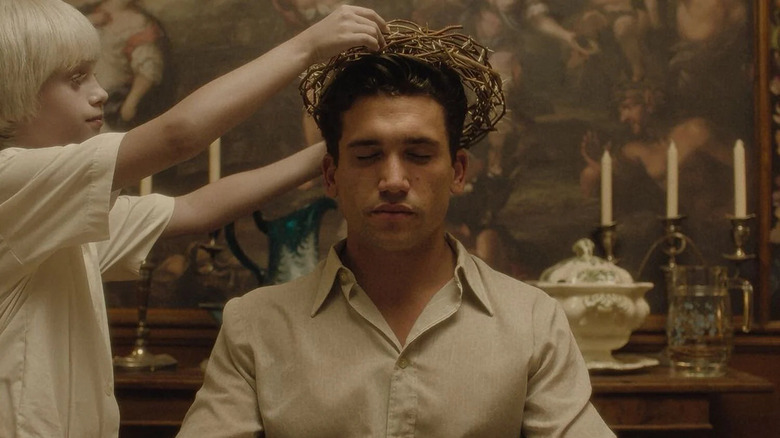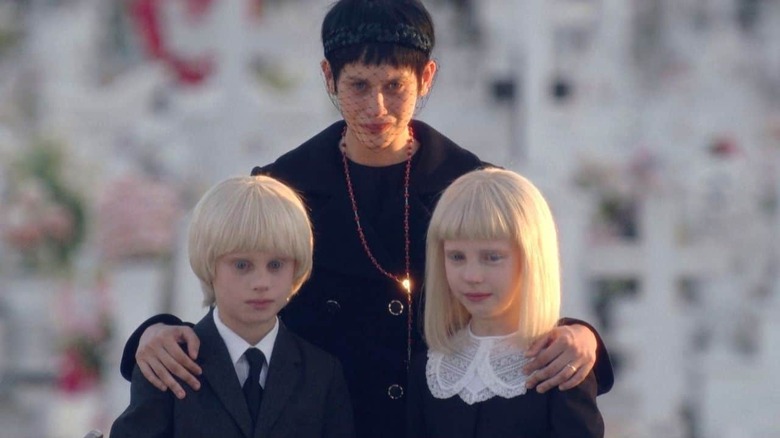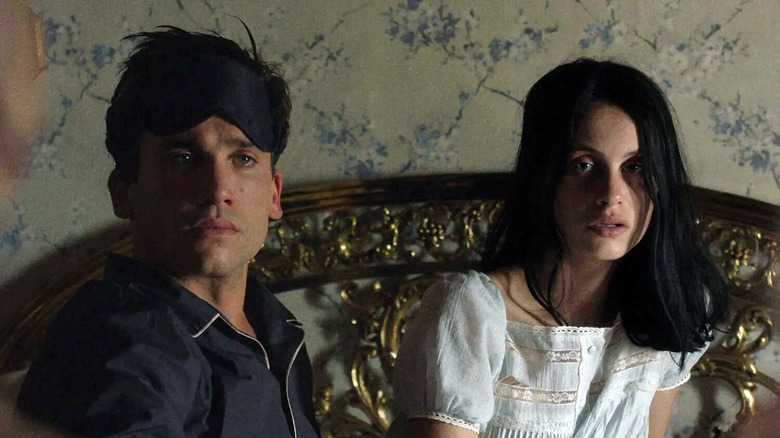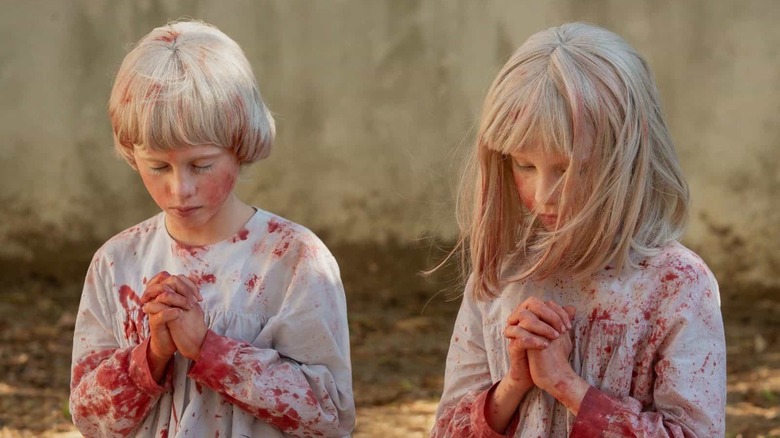Tin & Tina Is The Unnerving Spanish Horror Movie Currently Haunting Netflix
I've enjoyed churning through some of the less-heralded horror releases on Netflix recently, even if they aren't always masterpieces. I was pleasantly surprised by the kitchen sink elements of "The Strays," which explored Brexit-haunted Britain through a Black lens but undermined itself by trying too hard to emulate Jordan Peele. Better still was "Soft & Quiet," an extremely disturbing one-shot movie that puts us in the middle of a group of white supremacist women as they commit a despicable hate crime and try to cover their tracks.
Next up is "Tin & Tina," a psychological horror from Spain that recently hit the streaming platform's top 10. I haven't seen all that many Spanish movies so I was eager to give it a try, going in completely blind. While it isn't anywhere near as good as something like "The Devil's Backbone" or "The Orphanage," writer and director Rubin Stein, expanding his own short film to feature length, has interesting things to say about the dangers of prejudice and religious fundamentalism and a rather unusual way of exploring them.
Stein parcels up his ideas in an Evil Kid movie that seems hellbent on referencing just about every other superior film in its genre along the way, clearly tracing its roots to "The Bad Seed," "The Village of the Damned," "The Omen," and many others. In the second half, the doubting protagonist even cuts her hair to resemble Mia Farrow in "Rosemary's Baby." With soapy acting and a melodramatic screenplay and score, it plays almost like a parody at times. But is there more to Stein's directorial debut than initially meets the eye, and why has it been trending?
What happens in Tin & Tina?
"Tin & Tina" opens in 1981 as Adolfo (Jaime Lorente) ties the knot with Lola (Milena Smit) at a handsome church wedding. Their newlywed bliss is quickly cut short when the bride miscarries their twins, leaving her unable to have kids.
Six months later, Lola is still grieving for her babies. Adolfo wants her to move on, suggesting they adopt some children from the nearby convent. Lola relents and they are introduced to Tin (Carlos González Morollón) and Tina (Anastasia Russo), twins with albinism. The elderly Mother Superior (Teresa Rabal) says they are "unique and special children" who were abandoned at the convent when they were only a few weeks old.
Unique and special is about right. Walking in lockstep like the twins in "The Shining" and sporting "Midwich Cuckoo" haircuts, we immediately sense that these kids aren't normal. Adolfo thinks they're too old and too strange, but Lola is sold on the creepy moppets.
They take the twins home to their secluded villa and find that their adopted children have been totally brainwashed by their upbringing at the convent. They've never seen a TV before and prefer hymns and quoting the bible to pop tunes, and thank their new parents by gifting them a crown of thorns for Adolfo and a rosary for Lola. Oh, and they enjoy little games like making each other "see" God by asphyxiating one another.
Implausibly, Adolfo and Lola write off Tin and Tina's peculiar behavior as kids' stuff for the longest time, even after they poison and gut the family dog to "cleanse his soul." Killing the pet is all but forgotten come New Year's Eve when Lola suddenly faints. It's a miracle: She is pregnant again.
Warning: Spoilers ahead for how it all turns out.
Let's talk about that ending
After a few more scares during her pregnancy, Lola gives birth to a baby boy. Tin and Tina have been banned from religious stuff, but they decide that the arrival of a baby brother warrants a baptism in the swimming pool while Adolfo and Lola are preoccupied.
Lola catches them before they drown the baby and Adolfo, who has been ridiculously blasé about their behavior, burns their beloved bible and dumps them back at the convent with the Mother Superior. We know this isn't the end of the story because it's a psycho thriller with still half an hour to play. Free of the twins, Adolfo and Lola return home on a dark and stormy night. He goes up to the roof to fix the TV aerial and Lola suspects the children are in the house.
To her horror, Adolfo stumbles into the house on fire, setting the whole place alight. To make matters even worse, the baby is missing. After a fruitless search, Lola tries Tin and Tina's asphyxiation trick in the hope of another miracle and hears the baby crying. Rescuing the child just in time, she escapes the burning building and collapses outside.
Lola awakens in the hospital and receives a visit from the Mother Superior, who assures her that the baby is safe and the twins were asleep in the convent all night. "They are innocent," the nun tells her, and Lola accepts that they could have nothing to do with her husband's horrendous death. The film closes at Adolfo's funeral where Lola is joined at his graveside by the twins. "Amen," they say, and Lola responds in kind.
What does it all mean?
For the longest time, "Tin & Tina" plays possum with its hokey cavalcade of thriller and horror references before delivering an ending of unsettling ambiguity. It comes while you're twiddling your thumbs waiting for the obligatory twist and makes you question everything that went before.
There are at least two ways of reading it. If we stick to our initial impression that the twins are tainted in the bog-standard Evil Kid format, it is possible they were responsible for Adolfo's death and the Mother Superior is covering for them. Earlier in the film, they ask their new dad how far it is back to the convent; it is just about plausible that they trekked to the house, killed Adolfo in revenge for burning their bible, manufactured a miracle to make Lola regain her faith, and made it back to their beds before morning.
The more interesting interpretation is taking the nun's proclamation of the twins' innocence as the truth. From the outset, it is obvious that their emotional, social, and psychological development has been stunted by their strict upbringing in the convent. In that context, even killing the dog can be seen as them misguidedly taking the bible literally. Beyond that grisly scene, we don't actually see them doing anything violent or evil. It is possible that they are just two very sheltered and naive children in need of healthy parental love and guidance.
If this is the case, then you might argue that Rubin Stein slyly uses familiar tropes to prejudice our view against the twins because they look and behave oddly. That would be a really interesting (if bad faith) way to subvert our expectations before revealing them as innocent. But I'm not sure I can make that argument for "Tin & Tina."
Is Tin & Tina worth watching?
This is a tricky question. "Tin & Tina" is 90 minutes of horror references drawn out to 120 minutes of slow-burn psychological terror. Over the course of that two hours, the film hits just about every beat you'd expect. The family dog instantly senses something wrong with the twins; Adolfo is ridiculously casual about their creepy and dangerous behavior; and the class joker who makes fun of them is obviously dead meat from the moment he appears.
When the twins first appeared looking suitably weird and accompanied by thunder and lightning, I was buckling up for a so-bad-it's-good rollercoaster ride. Unfortunately, it never goes far enough or gets wild enough to tip it over into truly cult territory, with long stretches of boredom waiting for the next trope to drop. All that said, Rubin Stein does stage a couple of genuinely suspenseful scenes, and his child actors are really convincing as the twins. I was uncomfortable all the time they were onscreen, which is a lot of the movie.
I've never been a fan of star ratings, but, as someone who has written about movies online for many years, that method of scoring a movie always ticks over in my mind while I'm watching it. For most of the film, "Tin & Tina" plodded along at a mediocre two stars, but spiked to three stars when the unexpectedly subtle and thought-provoking end arrived. The ambiguous conclusion certainly elevates everything that goes before and it'll be one that keeps me pondering, so that just about warrants a recommendation.
